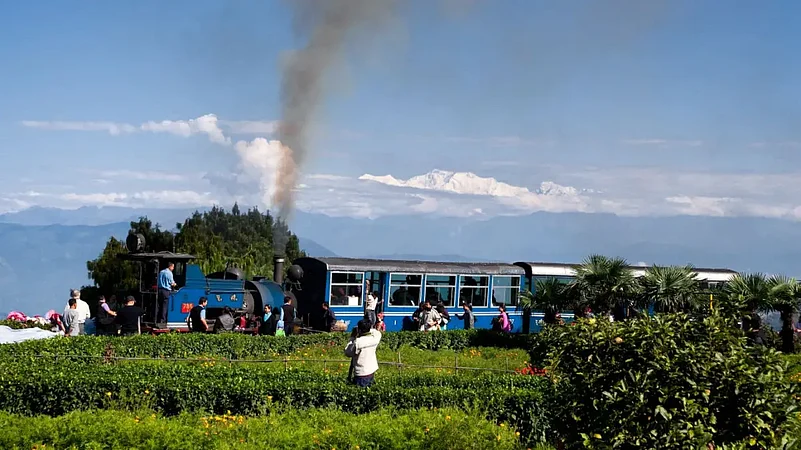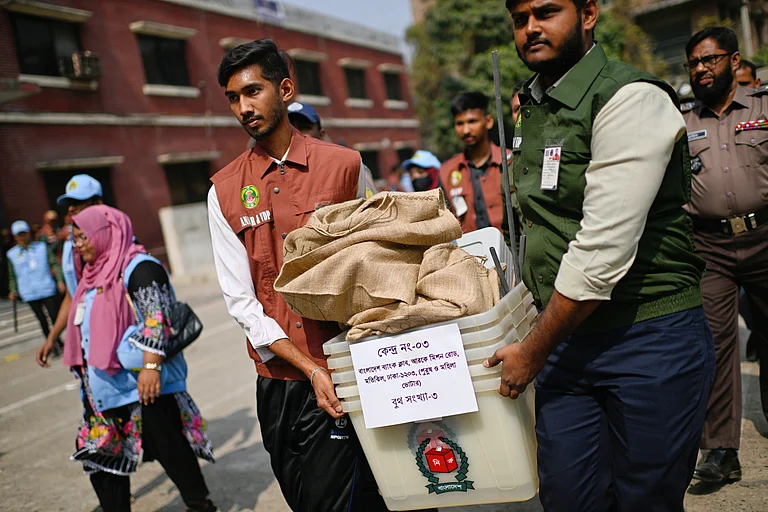There are two ditties that are forever attached to the Darjeeling Heritage Railway (DHR). One is the popular song from the 1969 Hindi film Aradhana, 'Mere sapnon ki rani', which had Sharmila Tagore travelling on the train, being serenaded by Rajesh Khanna who was chasing said train.
The other is less known - a nursery rhyme which children in Darjeeling grew up listening to - an ode of sorts to DHR: “Darjeeling ko sano rail, hirna lai abo tyari cha / Guard le shuna bhai siti bajayo” (Darjeeling’s dainty train is all set to chug off / Oh, listen to the guard blowing the whistle).
If there ever is a rollercoaster equivalent of a train, it would probably be the DHR which connects New Jalpaiguri with Darjeeling. The train is a thrilling ride with loops, turns and zigzags along its tracks to help gain its monumental height above sea level more easily. The line follows Hill Cart Road, which is part of National Highway 110.

One of the oldest rail routes in India, the Siliguri – Darjeeling railway in West Bengal started operation in 1881. The toy train runs 88 km between the destinations with the highest elevation of 2300m at Ghum station.


The railway found its place in the Unesco World Heritage site in the year 1999 for its unique infrastructure and the steam locomotives. Now it is clubbed under the Mountain Railways of India inscription of UNESCO World Heritage sites along with the Nilgiri Mountain Railway and Kalka Shimla Railway. In 2021, UNESCO had launched a stamp on Darjeeling Himalayan Railway.

There is a short steam loco ‘Joy Ride’ that takes passengers from Darjeeling to Ghum and back to Darjeeling, while taking you through the famous hairpin turn, the Batasia Loop and the Rail Museum at Ghum. It is also considered the world’s 22nd highest railway.

If you have some time, check out the display of DHR-related items at the musuem situated both in the upper storey of Ghum station building and in the area previously occupied by the goods and locomotive sheds. It is an ideal place to hang out at while waiting for the return journey. Museum admission is included in the 'Joy Train' fare or you can buy a separate admission ticket from the booking office.

One can witness breathtaking views from the train while experiencing the traditional chugging. Darjeeling being one of the prominent hill stations in the country is famous for its tea plantations and is visited by a huge number of tourists every year. Wandering across the tea plantations and the toy train ride would be perfect for a memorable vacation.

In 2017, the train service had scrapped the second class coaches in the daily service running between New Jalpaiguri (NJP) and Darjeeling. Now only trains with first class coaches were allowed on this route. As a result the fares have also gone up.
Since its inception, the DHR has ferried hundreds and thousands of passengers including well-known writers, artists, heads of state, kings and queens, and more. Mark Twain wrote after a trip on the DHR in 1896: "It was the most enjoyable day I have spent on Earth".

Here's an account by the Earl of Ronaldshay from 1923: "The discovery that here [Siliguri] the [main line] system ends and the two foot gauge of the Darjeeling Himalayan Railway begins, confirms what all these things hint at. [.....] One steps into a railway carriage which might easily be mistaken for a toy, and the whimsical idea seizes hold of one that one has accidentally stumbled into Lilliput. With a noisy fuss out of all proportion to its size the engine gives a jerk - and starts. [.....] No special mechanical device such as the rack is employed - unless, indeed, one can so describe the squat and stolid hill-man who is perched over the forward buffers of the engine and scatters sand on the rails when the wheels of the engine lose their grip of the metals and race, with the noise of a giant spring running down when the control has been removed. Sometimes we cross our own track after completing the circuit of a cone, at others we zig-zag backwards and forwards; but always we climb at a steady gradient."

All the steam locomotives in use on the railway were built by two of UK's steam locomotive manufacturere - Sharp, Stewart and Company, and later the North British Locomotive Company between. They built some 34 locomotives. However, only 12 were in use by 2005. And even less today. One of the locomotives was transferred to the Matheran Hill Railway for a 'joy train' ride. Another was taken out of India - the DHR 778. It was kept at the Hesston Steam Museum for many years, and was later restored and is now on a private railway - the Beeches Light Railway in Oxfordshire.





















